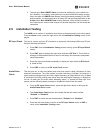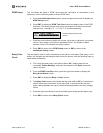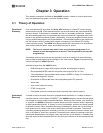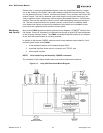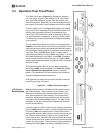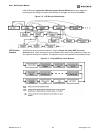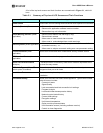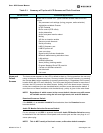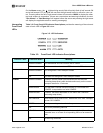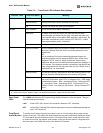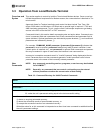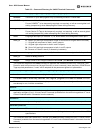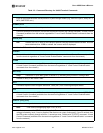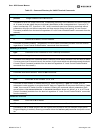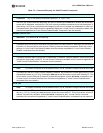
UNITY 4600 USER’S MANUAL
800032-01 Rev. F 28 www.wegner.com
Home and
Default
Screens
The home screen appears on the LCD by default at boot up. During operation, the user may
return to the home screen at any time, from any location in the menu hierarchy, by pressing
the Escape (ESC) button repeatedly (or pressing and holding it). Regardless of the current
location within the LCD menu hierarchy, if no front-panel keypress is made for more than 5
minutes, the LCD reverts to the default screen. Usually, this is the home screen. However,
under some conditions (two are described below), another screen becomes the default. If
more than one of these conditions exist simultaneously, priority is given in the order listed.
NOTE: Regardless of which screen is the current default, the user may still access
all available screens using the left- and right-arrow, ENT and ESC buttons.
Download Screen as Default
If the U4600 is in an ACCEPT PACKETS Download state, then the Download screen
becomes default.
Audio FP Monitor Selection Screen as Default
For two minutes, or until ESC is pressed, the Level 2 Audio FP Monitor Selection screen
is the default if the unit features a front-panel audio monitor jack and the user plugs in a ¼”
stereo phone plug.
NOTE: This is NOT usually a first-level screen, unlike other default examples.
Screen Name Functions/Applications
Unit Setup
Allows user to control unit. Typical controls located under this menu
include:
• Set permanent unit settings (tuning, program, audio selection)
• Add/edit/move/delete Presets
• NTSC Pedestal
• Buffer control (PCR offset)
• Audio attenuation
• Audio front-panel monitor select
• Muting
• VBI line re-insertion enable
• Recovery mode timeouts
• Serial port setup
• LNB LO frequency set
• LNB DC power set
• User cue relays
• Signal quality indicator thresholds
• Minimum alarm/warning indication times
• LAN settings
• NVRAM operations
• Alarm (history) latching enable
• Program Mapping Ghost PID pass list
• Current unit software selection
• Unit label edit
• Unit reset
Table 3.1: Summary of Top-Level LCD Screens and Their Functions



